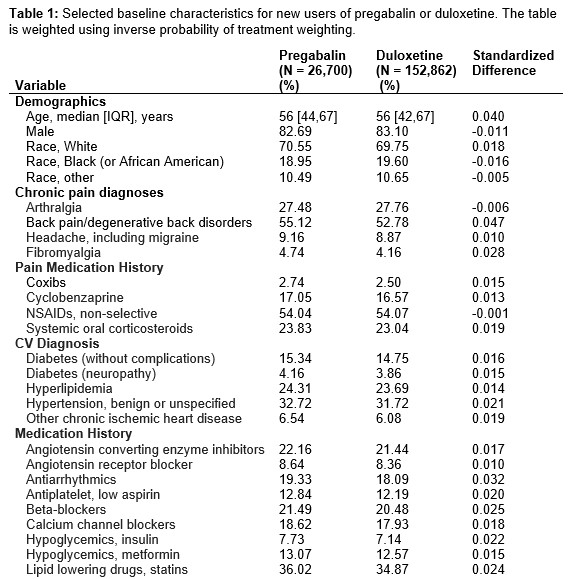Session Information
Session Type: Poster Session B
Session Time: 10:30AM-12:30PM
Background/Purpose: Musculoskeletal pain affects more than 10% of the general population. Recent trends in managing chronic musculoskeletal pain have favored non-opioid analgesics, for example, pregabalin, an antiepileptic medication that has the risk of adverse effects like respiratory depression and congestive heart failure. This study aimed to compare the all-cause mortality between new users of pregabalin versus duloxetine (the comparator) in US Veterans with chronic musculoskeletal pain.
Methods: This was a retrospective cohort study of US Veterans Health Administration patients, ages 18-89 years, with chronic non-cancer musculoskeletal pain who were new users of pregabalin or duloxetine between 2014 and 2022. We assembled the cohort using Veterans Administration Informatics and Computing Infrastructure (VINCI). We excluded veterans who were in long-term care or hospice, hospitalized for a month or more, and those with serious illness. The outcome was all-cause mortality which was obtained from vital status. Cox proportional hazard regression models were used to analyze the outcome over time, utilizing inverse probability treatment weighting to adjust for differences between the users of pregabalin and duloxetine. One hundred and fifty-five covariates were used in propensity scores. The covariates were chosen based on literature review and knowledge from past studies. The covariate categories included chronic pain indicators, demographics, musculoskeletal diagnoses, cardiovascular diagnoses and medications, medical care utilization, other medications, and other comorbidities.
Results: This study included 26,700 new users of pregabalin and 152,862 new users of duloxetine. The cohort was predominantly male (83.1%) and of reported White race (69.7%). Their median age was 56 years. During the study period, there were 2017 deaths. The rate of all-cause mortality in pregabalin users was 17.43 per 1000 person-years and the rate for duloxetine users was 13.7 [unadjusted HR 1.29 (95% CI: 1.14-1.45)]. However, these differences became statistically non-significant after adjustment for covariates [HR 1.09 (95% CI: 0.95-1.25)].
Conclusion: In this retrospective cohort study of US Veterans ages 18-89 years who have chronic non-cancer musculoskeletal pain, there was no statistically significant difference in all-cause mortality between pregabalin and duloxetine.
To cite this abstract in AMA style:
Campbell S, Daniel L, Dickson A, Wilson O, Stein C, Nepal P, Hung A, Chung C. All-Cause Mortality in Patients with Chronic Musculoskeletal Pain Using Pregabalin or Duloxetine: A Retrospective Cohort Study in US Veterans [abstract]. Arthritis Rheumatol. 2024; 76 (suppl 9). https://acrabstracts.org/abstract/all-cause-mortality-in-patients-with-chronic-musculoskeletal-pain-using-pregabalin-or-duloxetine-a-retrospective-cohort-study-in-us-veterans/. Accessed .« Back to ACR Convergence 2024
ACR Meeting Abstracts - https://acrabstracts.org/abstract/all-cause-mortality-in-patients-with-chronic-musculoskeletal-pain-using-pregabalin-or-duloxetine-a-retrospective-cohort-study-in-us-veterans/

